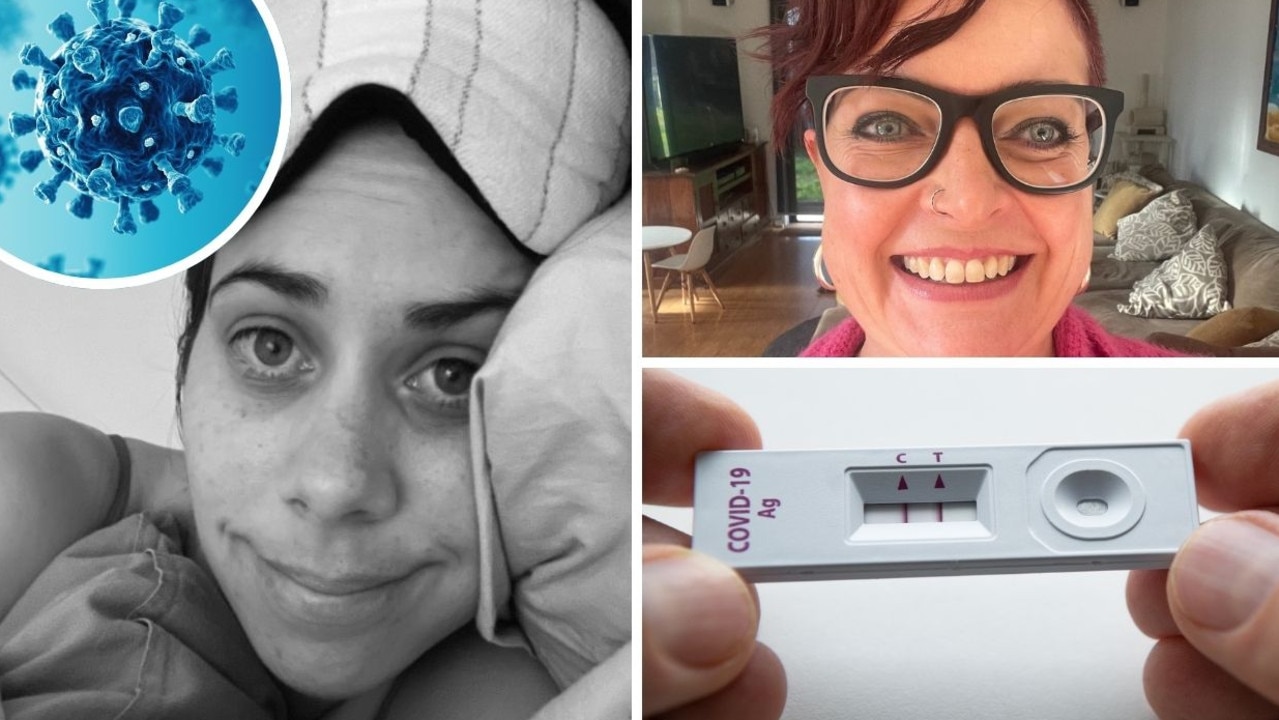Covid-19 Australia: Scott Morrison’s vaccine warning as part of Qld in lockdown
Scott Morrison has issued a new warning to those not vaccinated as Queensland will enter a tough new lockdown. NSW also recorded 210 cases.
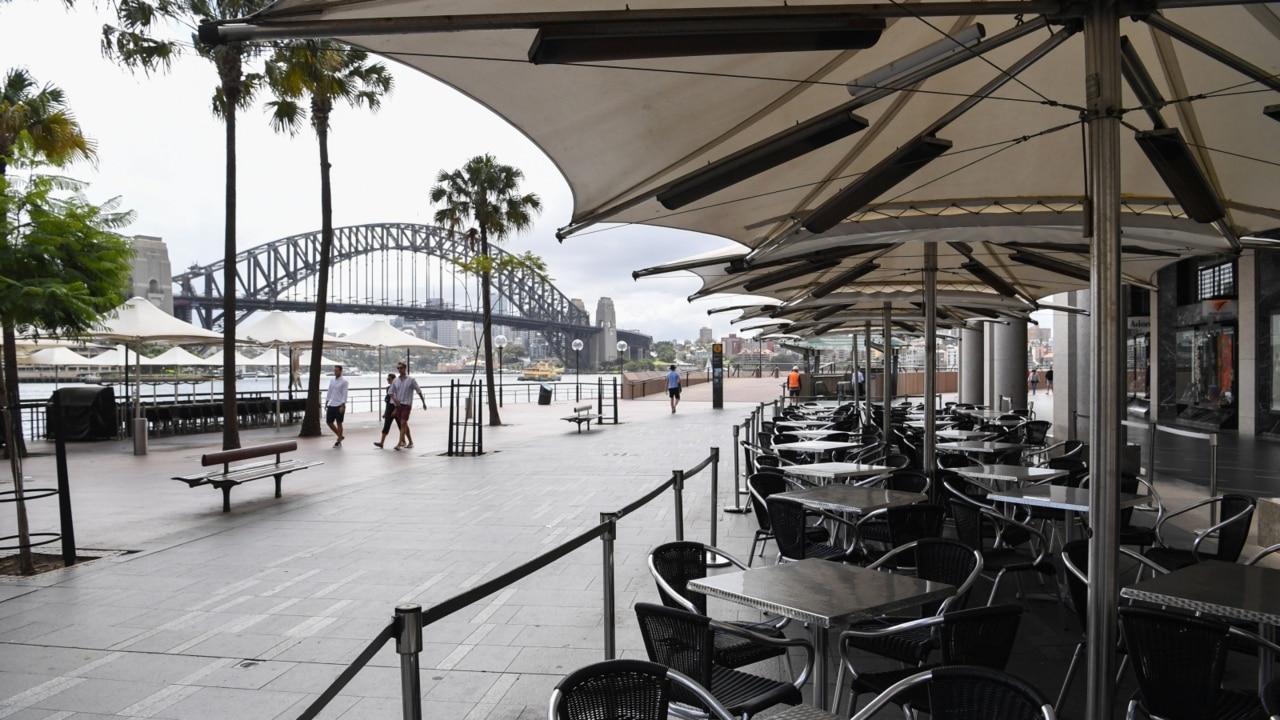
Coronavirus
Don't miss out on the headlines from Coronavirus. Followed categories will be added to My News.
Scott Morrison has delivered a pointed reference to wild conspiracy theories during an interview on talkback radio as he pleaded with Australians to follow scientifically supported medical advice - not fake experts on Facebook.
The odd remark comes after the Prime Minister revealed lockdowns would be discouraged and international borders would begin to reopen once 80 per cent of eligible Australians are fully vaccinated against Covid-19.
Morrison said he hoped the agreement on the target would encourage the population to get the jab as vaccine hesitancy persists and disenfranchised citizens take to the streets in anti-lockdown protests.
“By getting vaccinated, you're getting a step closer every single day to getting us back to about as normal as you can be when you’re living with Covid-19,” he told 2GB on Saturday morning.
When discussing the prevailing rate of vaccine hesitancy across the country, Morrison urged Australians to resist following views of conspiracy theorists and to “go and talk to your doctor”.
“If you are concerned, don't talk to Doctor Google, go talk to your doctor,” the Prime Minister said.
“Don’t talk to someone who’s going to tell you you’re going to turn into a magnet or, you know, don’t go on Facebook to listen to people who don’t know what they’re talking about.”
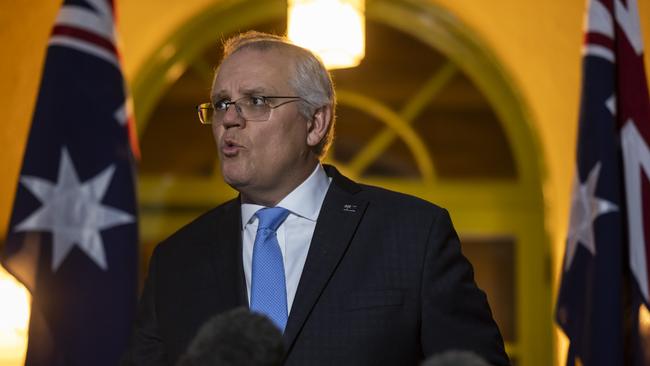
The bizarre magnet reference is likely in relation to the unusual theory among alternative communities who fear the substance of the vaccine, with some even believing it will allow the recipient to connect to the internet.
The theory originated because some mRNA vaccines, a new type of jab used to protect against infectious diseases, include a material called hydrogel, which is used to help disperse the vaccine slowly into the recipient’s cells.
The fear of being a vessel to connect to Wi-Fi is, of course, nonsense and flatly rejected by the federal Health Department.
“Bioengineers have used similar hydrogels for many years in different ways,” the health authority said earlier in the year. “For instance, they’ve used them to help stem cells survive after being put inside our bodies.
“Because of this, some people believe that hydrogels are needed for electronic implants, which can connect to the internet.”
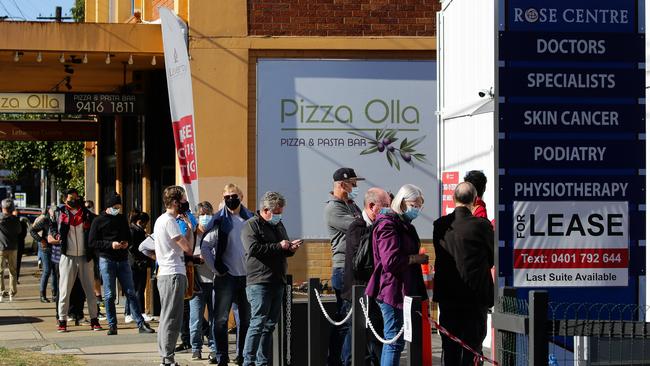
But the Pfizer mRNA vaccine doesn’t even contain hydrogels as a component, instead using a piece of mRNA that is “coated in a lipid (fatty) droplet”.
“The lipid helps the vaccine enter our cells, as the membrane holding our cells together is also made mostly of lipid,” the Department of Health said.
“The vaccine and the membrane can fuse easily, depositing the mRNA inside the cell.”
According to the Centre of Disease Control in the US, no ingredient in any Covid-19 vaccine is capable of producing electromagnetic force - at the injection site or anywhere else in your body.
“COVID-19 vaccines do not contain ingredients that can produce an electromagnetic field at the site of your injection,” official advice states. “All COVID-19 vaccines are free from metals.”
Morrison said he was ambitious the threshold for vaccinations would be reached by Christmas so the country can attempt to return to normalcy by 2022.
“There’ll be enough vaccines,” he said in regards to 80 per cent of the population being vaccinated by the end of the year.
“There’ll be enough pharmacies, enough GPs, enough clinics, enough of all of that to achieve that.
“So it’s all up to all of us now.”
SE QLD GOES INTO LOCKDOWN
Brisbane has been plunged into a three-day lockdown which the Deputy Premier Steven Miles has said will be the “strictest” enforced on Queensland throughout the pandemic.
From 4pm on Saturday, 11 Local Government Areas in southeast Queensland will be forced to stay home until Tuesday afternoon after six new local cases were reported.
Health authorities declared the only four reasons any residents in those areas can leave home after the new infections from the mystery cluster were confirmed to have contracted the highly infectious Delta variant.
Those few reasons to leave home include:
- Buy essentials such as grocery and medications
- Work if you can’t work from home. No school, except for those children of essential workers
- Exercise within 10km from home
- Healthcare, including to get a Covid-19 vaccination or to provide help, care or support
The affected LGAs are Brisbane, Ipswich, Logan City, Moreton Bay, Redlands, Sunshine Coast, Gold Coast, Somerset, Noosa, Lockyer Valley and Scenic Rim.
There will be no visitors to homes in those LGAs, and non-essential businesses will be forced to close down.
“Hospitality – pubs, clubs, cafes – will be restricted to takeaway only,” Mr Miles said.
“Cinemas, entertainment venues, hairdressers, gyms, places of worship will all be closed.”
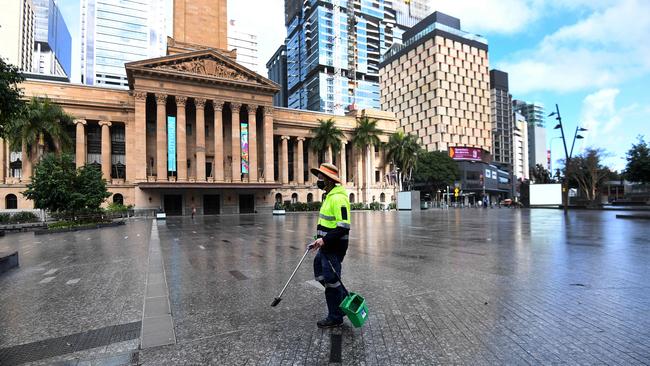
The lockdown rules will apply to those who have been in the impacted LGAs from 1am on Saturday morning, Mr Miles said as he urged millions of Queenslanders to not wait until 4pm and “please go home” immediately.
“So, even if you are no longer in those 11 LGAs, if you were at 1:00am this morning (or after), these restrictions apply no matter where you are now,” he said.
“Grocery stores will stay open throughout the lockdown so please don't think that you need to rush to get essential items.
“You will be permitted to leave your homes for essential items. Please don’t rush our grocery stores — that creates a risk of infection that we want to avoid.”
The 10km geographic restriction is a tougher layer to this lockdown compared to the many enforced on Queensland over the last 18-months, with health authorities increasingly anxious of a destructive outbreak similar to the current crisis in NSW.
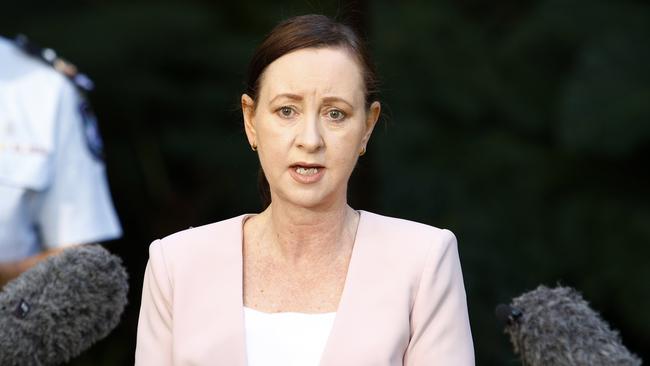
The announcement came as the state recorded six new locally acquired Covid-19 cases on Saturday, all linked to the 17-year-old who tested positive to the virus on Friday.
Chief health officer Jeannette Young pleaded with those in the southeast to stay at home because she doesn’t “want people going out of their immediate area and then spreading the virus to a broader area”.
“At the moment, I don’t know where this virus is in southeast Queensland,” she told reporters on Saturday.
“It could be anywhere.”
NSW RECRDS WHOPPING 210 CASES
New South Wales recorded 210 new locally acquired cases of Covid-19 as of Saturday.
It came as the state grapples with a rapidly accelerating outbreak after recording hundreds of new infections throughout the week.
NSW Health Minister Brad Hazzard told reporters that the majority of the new cases overnight were in south-west Sydney and western Sydney.
“We had 81 cases acquired in south-western Sydney and 72 cases acquired in western Sydney,” he said.
“Again, the focus, unfortunately, has been in that area and I’d ask everybody in the local area to do what NSW Health has asked on many occasions and that is a stay-at-home.
“Just stay-at-home unless you must go out, unless it is essential that you go out. Stay-at-home. Definitely do not go and visit another household.
“I know you want to visit your aunts and uncles and cousins. We all do but unfortunately, that is continuing to be a very dangerous exercise and the virus is continuing to spread.”
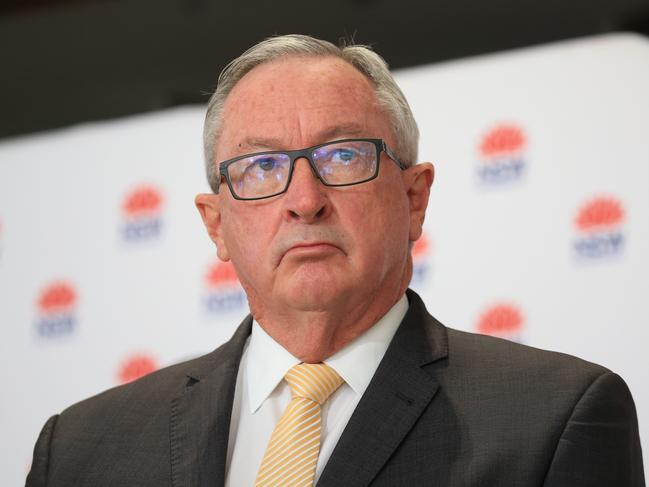
Mr Hazzard said the Delta strain was circulating among younger people in the community, with 138 of the new cases in people under the age of 40.
There are 198 people in hospital, including 53 in intensive care and 27 requiring ventilation.
“That tells us that is an extremely serious disease and people are ending up in our hospitals in substantial numbers,” Mr Hazzard said.
Six people aged in their 20s are among those in intensive care.
NSW also recorded two overseas acquired cases overnight.
To 8pm last night, NSW had 105,000,963 tests conducted.
On Friday, health authorities issued an alert for nearly 50 additional venues of concern despite the Sydney lockdown, as chemists and other essential business continue to be exposed to positive infections.
Meantime, Victoria recorded two new locally acquired cases as of Saturday.
Both are linked to existing clusters, however one case was not in quarantine for their infectious period.
PM SETS VACCINE TARGET
Prime Minister Scott Morrison revealed new vaccine targets Australia's states and territories must meet to get out of lockdowns and re-open international travel.
Mr Morrison confirmed 12 million doses of Covid-19 vaccines have been given and detailed a new four-step road map out of the pandemic.
One in four people over 50 are fully vaccinated and 40 per cent of those over 70. Of those over 70, 80 per cent have had the first dose.
Mr Morrison said the plan was based on vaccination targets that each state and territory have to reach, on recommendations from the Doherty Institute.
The states have agreed that “no state … is required to increase restrictions beyond where they are right now,” the PM aid.
Australia is still under phase 1 – suppression – of the four phase road map he announced last month.

Australia will stay at that stage until we hit a vaccination target of 70 per cent.
Mr Morrison said states can only move to the next stage of Phase B if the whole country reaches that average on a national level, and then that state itself also reaches 70 per cent.
“I believe we can get there by the end of the year to 70 per cent,” Mr Morrison said on Friday. “The UK has got there. Israel has got there.
“It’s done as a team effort. We are seeing our Olympians show that team spirit over there in Tokyo, and we will hit these targets with what I believe will be a gold medal run to the end of the year.”
“All of Australia has to get there together on average.”
The target needed for the next stage, Phase C, is 80 per cent – at this point, lockdowns in Phase B are less likely.
Mr Morrison said once Australia reaches Phase B, vaccinated people will face fewer restrictions. “The details of that are still to be worked through,” he said.
“We’ve established a small working group involving the Northern Territory, Victoria and Tasmania, and they will lead the work on that process.
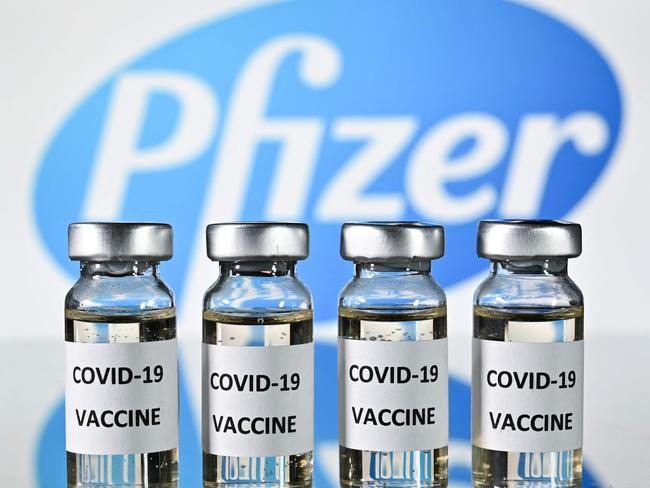
“So if you get vaccinated, there will be special rules that apply to you. Why? Because if you’re vaccinated, you present less of a public health risk. You are less likely to get the virus. You are less likely to transmit it,” Mr Morrison said.
There will also be a higher arrival cap for vaccinated travellers. After reaching Phase C, he said Australia will lift all restrictions on outbound travel for vaccinated Australians and extend the travel bubble for unrestricted travel to new candidate countries.
“There will be a gradual reopening of inward and outbound international travel with safe countries, safe countries, those that are have the same sort of vaccination levels that Australia has and proportionate quarantine and reduced requirements for fully vaccinated inbound travellers,” he said.
The final phase does not have a vaccination target set at this point. One was not recommended by the Doherty Institute.
“The final phase involves opening international borders, quarantine for high-risk inbound travel only … living with Covid,” he said.
“Because once we get above the 80 per cent, the scientific evidence shows that we’re largely then in a place where Covid can be managed consistent with other infectious diseases and of course, we don’t apply those types of restrictions to the flu or many other things like that.”
He also declined to say how long it will take to reach 70 per cent vaccination when asked if it will be by the end of the year.
“We’re not going to set timetables on it. I would hope so, but that is entirely up to how the nation responds to this challenge,” he said.
Mr Morrison said the government was also making great progress on digital vaccine certificates.
“It already exists for those who are getting vaccinated now but to be able to, in the next phase, and we are only days away from this, for it to be dropped into an Apple wallet or wallet,” he said.
TASSIES UNDER 40 CAN GET PFIZER JABS
All Tasmanians aged 30-39 will be eligible to book a Pfizer vaccine as early as next week, Premier Peter Gutwein has announced.
“From Monday, vaccination centres will start to take all eligible people over the age of 16 and all eligible people over the age of 30 will be able to book a vaccination and there are spots available in August,” Mr Gutwein said.
Health Secretary Kathrine Morgan-Wicks said Tasmania’s vaccination program was “gathering pace”.
“In our older age groups more than 83% of people aged 70 years and over have received a first dose and more than 45% have been fully vaccinated,” she said.
“Community pharmacies will also be shortly joining in and with an increase of Pfizer available to both the state and our GPs we are gathering pace.
“This is absolutely the right time to introduce our 63,000 30-39-year-olds to our vaccination rollout.”
Ms Morgan-Wicks said they had 11,000 extra appointments had just been added in the last hour.
NEW VACCINE SAFETY STUDY
The AstraZeneca vaccine is no more threatening than the Pfizer alternative and patients are more likely to get blood clots from Covid-19 than the jab, a new study has found.
In an article published in The Lancet this week, scientists said the Oxford-made vaccine had a “similar safety profile” to the Pfizer vaccine.
The study showed patients developed blood clotting conditions after receiving the AstraZeneca Covid-19 vaccine at a “similar” rate to those who had the Pfizer shot.
A team of researchers from the UK, Spain and the Netherlands correlated data from over 1.3 million people vaccinated against Covid in Spain, looking for evidence of blood-clotting conditions that developed after they had their vaccinations, according to a report in Euro News.
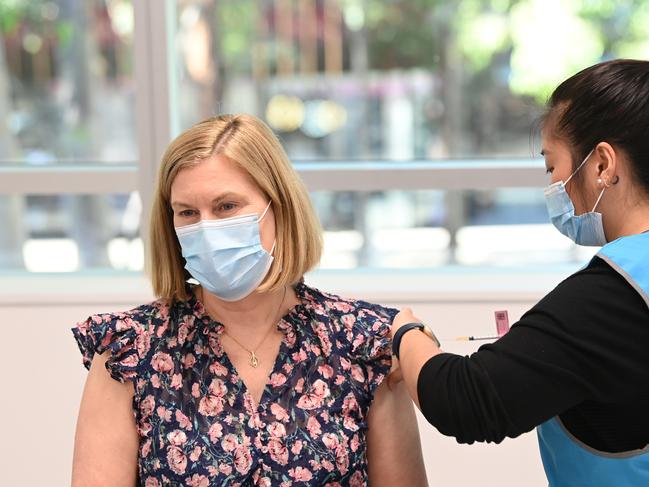
“In this study including 1,372,213 people vaccinated against SARS-CoV-2, similar safety profiles were seen for both vaccines,” the researchers wrote in their paper, due to be published in the Lancet medical journal.
The study authors reportedly found that people who contracted coronavirus developed blood clots at a much higher rate than those who had received either the AstraZeneca or Pfizer vaccines.
The not yet peer-reviewed findings come after a difficult period for the AstraZeneca vaccine. In April, the European Medicines Agency (EMA) said there was a “possible link” between the vaccine and “very rare cases of unusual blood clots with low blood platelets”.
Following the discovery, many countries around the world set restrictions on its use.
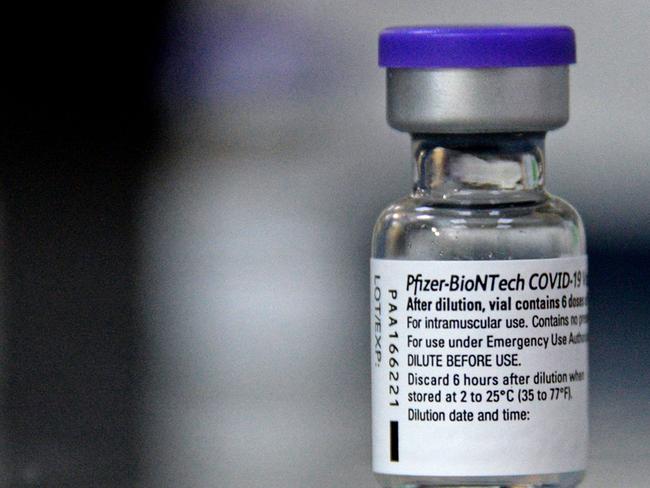
AUSTRALIA RECORDS MORE CLOT CASES LINKED TO JAB
It comes as Australia recorded six more cases of rare blood clots “likely linked” to the AstraZeneca vaccine.
In it’s weekly safety report, the Therapeutic Goods Administration said one case was “confirmed” in a 74-year-old woman from Victoria.
The other cases, deemed “probable”, were two 61-year-old women from NSW, a 71-year-old man from NSW, a 72-year-old man from Queensland and a 77-year-old man from Victoria.
The latest cases bring the total cases of blood clots in Australia to 90 (54 confirmed, 36 probable) from about 6.3 million doses of the AstraZeneca vaccine administered to date.
In Australia, severe cases of blood clots appear to be more common in women in younger age groups. Nearly half of the cases in women required treatment in intensive care.
Four of the five deaths from blood clots linked to AstraZeneca occurred in women aged 48 (two cases), 52 and 72 years old. The other death was in a 44-year-old man.
Early detection of blood clots may help to prevent more serious complications from developing.
The TGA warns people should seek medical attention if they develop any of the following symptoms after vaccination:
– severe or persistent headache, blurred vision, confusion or seizures;
– shortness of breath, chest pain, leg swelling or persistent abdominal pain;
– unusual skin bruising and/or pinpoint round spots beyond the site of vaccination.
The most common time period for onset of blood clot symptoms is four to 30 days after vaccination.
More Coverage
Read related topics:Scott Morrison




